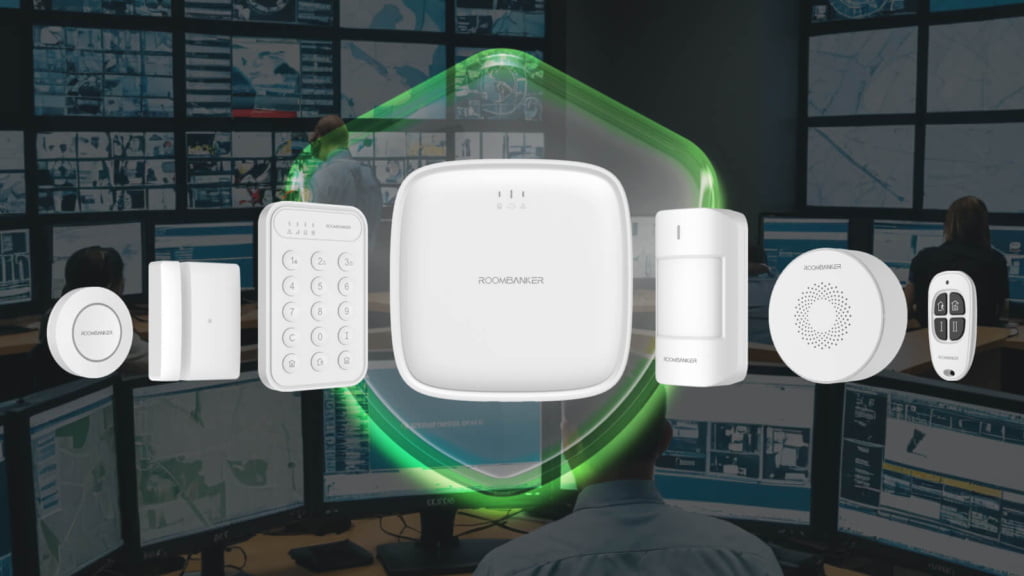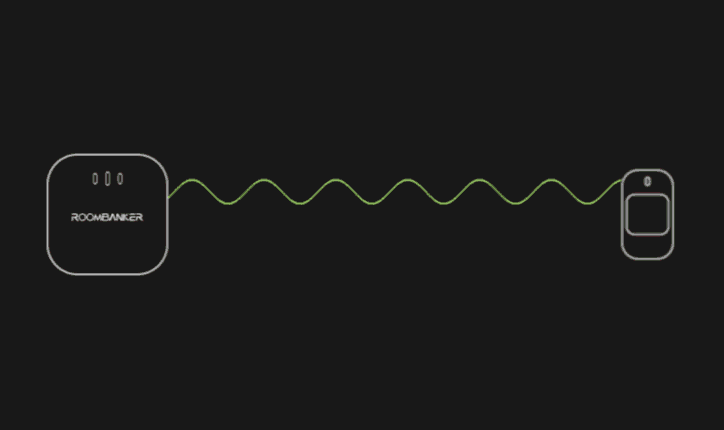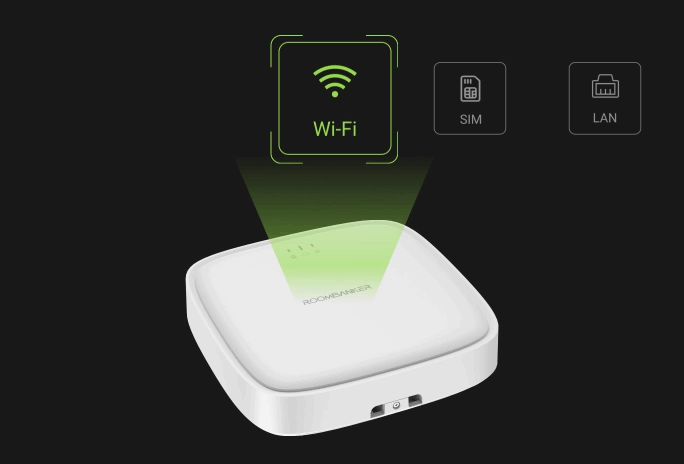Wireless burglar alarm systems are more reliable than you might expect, even though some may dismiss them as toys compared to wired systems. While the home security market is still largely dominated by professionally-installed wired security systems, the growing presence of wireless, easy-to-install, and portable alarm systems like those offered by SimpliSafe and Eufy is noteworthy.
So, the question arises: are wireless alarms sufficiently advanced and reliable to compete with wired systems? In this field, two major names stand out: Ajax and Hikvision, both of which have earned a strong reputation in the global market for their wireless alarm systems. In addition to these, we will introduce another emerging player: Roombanker.

Are Wireless Burglar Alarms Reliable?
If you had posed the question “Are wireless burglar alarms any good?” two decades ago, the likely answer would have been negative. However, with today’s advanced wireless technologies like Sub-GHz, Bluetooth, and Zigbee, which have gone through multiple iterations, their reliability has been greatly enhanced in various scenarios.
Historically, the market was led by wired security systems, but truly hardwired systems are becoming increasingly rare. It’s clear that wireless security systems now offer more functionalities than their wired counterparts. The wireless nature of these systems opens up numerous possibilities, such as remote access and seamless integration with home automation systems. In the following paragraph, let’s explore detailed reasons in detail.
Also read: Why wireless alarm system prefer proprietary protocols?
What Makes Wireless Burglar Alarms Reliable?
Resist Signal Loss
High-quality wireless burglar alarms are designed with omnidirectional antennas—sometimes featuring external antennas—to provide thorough coverage and combat signal loss caused by household obstacles.

Prevent Interference
Advanced alarms utilize two-way communication to ensure that detectors and devices remain consistently online. If there is any jamming (as some intruders might attempt to disrupt detector operation) or device failure, the central hub will quickly recognize the absence of expected signals from the detectors and report these issues.
Minimize Data Loss
Reliable burglar alarms employ TDMA and Listen Before Talk protocols to ensure orderly data transmission from detectors to the central hub, reducing interference and preventing data loss that could signal irregularities at home. To put it another way, every data packet from the peripheral detectors will be sent sequentially to the central hub. The loss of data could indicate unusual activity at home.

Anti-Jamming
Modern burglar alarms employ frequency-hopping suppression to stop intruders from bypassing the alarm system by using signals within the same frequency band. Along with FHSS, AES-CCM data encryption is also commonly used to thwart attempts by outsiders to intercept and replicate signals.

Network and PowerBackup Mechanism
To address common issues like sudden WiFi disconnection or power outages, wireless alarm systems are always designed with backup mechanisms.
For example, the control panel features a 4G cellular connection in addition to Wi-Fi. The 4G card you insert will begin to function when Wi-Fi fails. In addition, a lithium-ion battery backup keeps it operational for several hours after the power outage.

Low Power Mode
For battery issues, wireless burglar alarm detectors are frequently made using low-power wireless protocols such as RBF, Z-Wave, Sub-GHz, etc. Compared to Wi-Fi, these protocols use less power and can function for several years, with mobile apps providing timely low battery alerts for proactive replacements.
These advanced features significantly enhance the reliability of wireless burglar alarms. Although they might not yet match the full reliability of wired systems, their ease of installation, aesthetic design, affordability, and portability make them a popular choice in the modern home security market.
Advantages of Wireless Burglar Alarms
While we can’t directly compare the functionality of wired alarms and wireless alarms, we can understand the benefits that wireless burglar alarms offer.
- Improved Security
Burglars may cut wires to break down security systems. These could be the wires that connect the sensors to the control panel in a hardwired system, or they could be landline and cable internet lines. For wireless security systems, it increases the difficulty for burglars to destroy the alarm system.
- Over-the-air Updates
Firmware updates for wireless security systems are done automatically and often over the air. This means that you won’t need to change your hardware in order to get updates. Above all, these updates can protect your security system against intrusions like hacking.
- Continuous Monitoring
The majority of wireless security systems feature backup communications and battery solutions. These solutions keep the systems operational even in the event of power failures.
- Easy Installation
These security systems are simpler to install because they are wireless. Most users actually install these security systems themselves.
- Personalization
Customization and do-it-yourself installation go hand in hand. You can add sensors and other parts to your wireless system as you see fit, even after it has been configured.
- Remote access
Wireless security systems use cellular or Wi-Fi signals to communicate. You can use smartphone apps to get remote access to the systems. Apps allow you to arm, disarm, and operate your system anytime.
Have Wireless Burglar Alarm Systems Overtaken Wired Security Systems?
Wireless burglar alarm systems have not surpassed wired systems in dominance. As previously mentioned, wired systems still lead the security industry.
That said, wireless burglar alarm systems offer an appealing alternative in today’s home security market. They provide a cost-effective solution for homeowners with varying budgets, making it easier to obtain a reliable alarm system. Renters benefit from the portability of wireless systems, allowing them to take their security system with them wherever they move. Additionally, the sleek design of wireless systems minimizes disruption to home decor. These advantages give homeowners more options and flexibility, as wireless systems allow for easy self-installation and integration of new devices without the need for third-party assistance and fees.
However, in certain environments, such as banks, airports, jewelry stores, and other high-security locations, professionally installed and monitored wired systems are essential. For those with a substantial budget who are willing to undertake the installation of a comprehensive system—complete with drilling and running wires through ceilings, attics, or basements—wired systems remain a strong option worth considering. Also, a landline-based wired security system is a better option if you are in a remote region with poor reception for cellular signals and unreliable internet access.
Wireless vs Wired Alarm System
When we compare wired and wireless alarm systems, both of them complete the same function. Let’s take a look at both the systems side by side.
| Feature | Wireless Burglar Alarm | Wired Burglar Alarm |
| Installation | Easy to install; usually requires no professional help. | Requires professional installation; involves wiring through walls. |
| Cost | Generally lower upfront cost; no need for extensive wiring. | Higher upfront cost due to installation and wiring expenses. |
| Flexibility | Highly flexible; easy to move or add components. | Less flexible; hard to move or expand without rewiring. |
| Maintenance | Low maintenance; battery-powered sensors need regular checking. | Low maintenance; relies on stable wired connections. |
| Reliability | May be affected by signal interference or battery life. | May be affected if the cables are cut. |
| Aesthetics | Minimal impact; no visible wires. | Can be intrusive; visible wiring if not properly concealed. |
| Scalability | You can add new sensors or devices without much effort. | Adding new components may require additional wiring. |
| Power Source | Battery-powered | Powered by the main electrical system. |
| Connectivity | Connects via Wi-Fi or cellular networks. | Hardwired connection. |
| Vulnerability | Vulnerable to hacking or jamming of wireless signals. | Vulnerable to external interference or tampering. |
| Range | Limited range depending on the strength of the wireless signal. | Not limited by range within the premises as long as it’s wired. |
| Suitable For | Renters or small to medium-sized homes with a budget. | Permanent homeowners wanting a stable system and for whom budget is not a problem. |
How Do Wireless Burglar Alarm Systems Work?
In general, wireless security systems use a wireless protocol to link devices. These might include Bluetooth, Wi-Fi, Zigbee, and Z-Wave. In order to get expert monitoring, the majority of wireless systems establish a wireless connection with a monitoring center like the hub.
While some wireless systems need to be professionally installed, most may be installed yourself. After you receive each part, all you have to do is place it somewhere, connect it to the control panel, and turn on the system. For wireless systems that are connected to the internet, you will also need to link the control panel to the Wi-Fi network in your house.
The system reacts to alarms in the following way once it is online:
Wireless alert signals are sent to the control panel by the sensor that discovered the break-in.
- The alarm goes off through the control panel.
- The control panel uses Wi-Fi or cellular signals to notify both the homeowner and the monitoring center simultaneously.
- After confirming the alarm, the monitoring center gets in touch with the user.
- The monitoring center asks for police dispatch if they think it’s essential.
Final Words – Roombanker is Looking for Alarm System Distributors
Roombanker is an emerging provider of wireless alarm systems, offering a diverse range of security solutions designed to safeguard apartments, houses, and small businesses from intrusions. Our intrusion alarm product lineup includes robust control panel with a mobile app, pet-friendly PIR sensors, door and window contacts, alarm sirens, portable key fobs and alarm keypads, all engineered to ensure safety and security.
Our wireless alarm systems boast a sleek aesthetic, advanced system and wireless technology, and competitive distribution pricing. We warmly invite you to review our distribution policy for more information, as we are actively seeking alarm distributors worldwide.
FAQs on Wireless Alarm System
Are wireless burglar alarm systems reliable?
Wireless security systems do function reliably. Choose wireless devices with cellular backup if you’re concerned about the dependability of your internet connection. If you’re concerned about hacking, you can take precautions to reduce the vulnerability of your wireless system. Some of these precautions include installing antivirus software on your devices, creating strong account passwords, and only using secure Wi-Fi protocols.
Wired or wireless: which one is better?
Wireless security systems are excellent for home security. They offer more sophisticated features like smart home management, remote access through applications, and quicker alarm transmission. Since wireless security systems don’t require drilling, installation is also simpler. Additionally, because there are no wires to cut, they are immune to the well-known burglary tactic of cutting cables to turn off security systems.
Are wireless burglar alarms secure?
Yes, wireless burglar alarm systems are very secure. They are immune to both physical and cyber threats. They also use anti-masking technology that makes sure motion detectors are not purposefully blocked.
